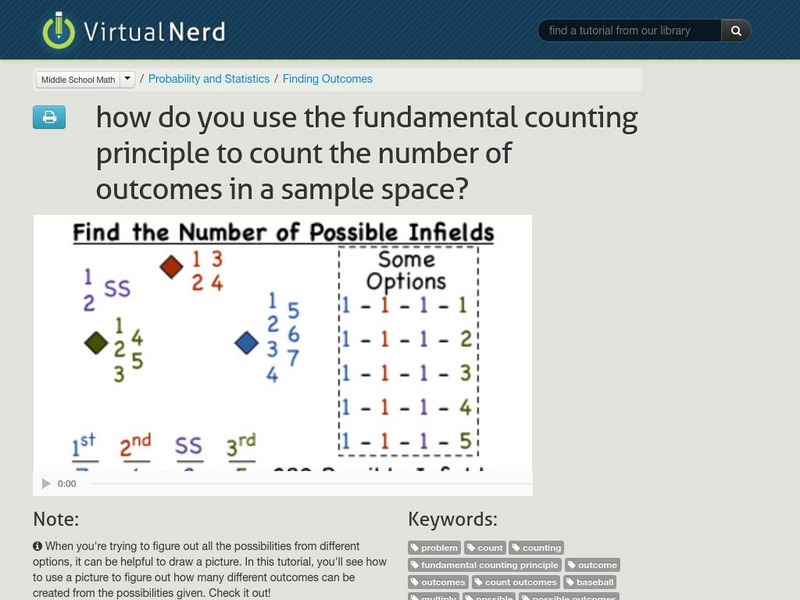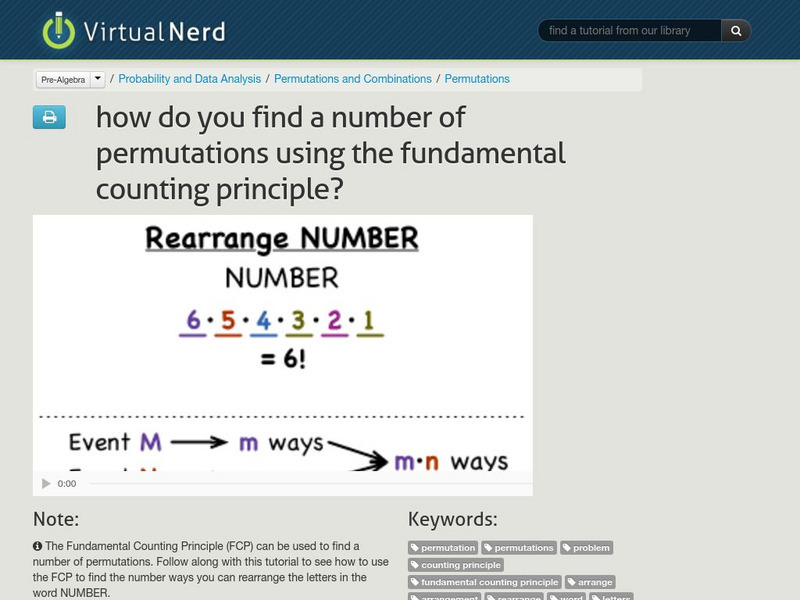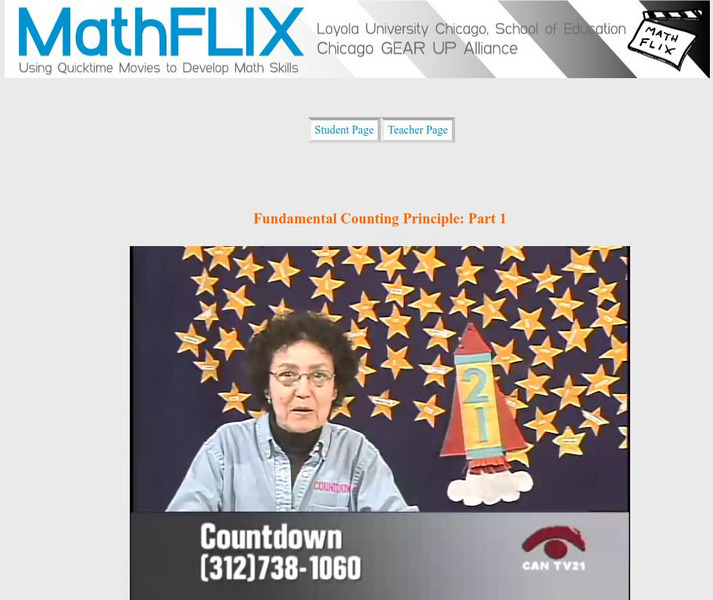Hi, what do you want to do?
Curated Video
Using a Tree Diagram - Probability
In this math video we will be using a tree diagram to determine the number of different combinations possible for desired outcomes. We will learn how to read a tree diagram showing probable outcomes. We will use the tree diagram to...
msvgo
Problems Based on Cartesian Equation of a Circle
It covers solved problems based on finding the equation from given parameters and finding the parameters from a given equation.
Curated Video
Probability: Events, Outcomes, and Probability of Single and Compound Events
This video is a comprehensive guide to probability, covering events and outcomes, experimental and theoretical probability, compound probability, and sample spaces. The teacher explains each concept clearly and provides examples and...
Curated Video
Probability Review Grade 7
In this video lesson, we will review outcomes and events. We will learn to describe probability based on likelihood of an event occurring. Simple probablity will be explained and modeled. You will discover the difference between...
Curated OER
How Do You Use the Fundamental Counting Principle to Count the Number of Outcomes in a Sample Space?
Sometimes all you need is an image to help solve a word problem. This tutorial shows how drawing picture can help you determine a correct number of possibilities with given data. You can also use the FCP or fundamental counting principle...
Curated OER
How Do You Find a Number of Combinations Using the Fundamental Counting Principle?
What is the Fundamental Counting Principle? Have you ever come across word problems that give you a bunch of options and you are asked to figure out the number of possible combinations? Well, if you know how to use the Fundamental...
Curated OER
How Do You Find a Number of Permutations Using the Fundamental Counting Principle?
The notion of permutations is used when rearranging objects or values. How many ways can the letters in the word NUMBER be rearranged? Don't try writing them all out one by one because it would take a long time. Use the Fundamental...
Curated OER
What is the Fundamental Counting Principle?
Oh my, five types of bread, eight kinds of lunchmeat, and six choices of cheeses. How many different combinations of sandwiches can be made? That's going to take a long time to figure out. No, it's not. Just use the Fundamental Counting...
Curated OER
How Do You Find a Number of Combinations Using the Fundamental Counting Principle?
What is the Fundamental Counting Principle? Have you ever come across word problems that give you a bunch of options and you are asked to figure out the number of possible combinations? Well, if you know how to use the Fundamental...
Virtual Nerd
Virtual Nerd: How Do You Find a Number of Permutations Using Fcp?
The Fundamental Counting Principle can be used to find permutations. This tutorial will walk you through the steps with an example of finding the number of ways to rearrange the letters in the word NUMBER. [4:25]
Virtual Nerd
Virtual Nerd: What Is the Fundamental Counting Principle?
The Fundamental Counting Principle is a way to find out the total number of ways different events can occur. Watch this example using multiple types of meat, cheese, and bread to see how many types of sandwiches you can make. [5:54]
Virtual Nerd
Virtual Nerd: How Do You Use the Fcp to Count the Number of Outcomes in a Sample
Using baseball as an example, watch how you can apply the Fundamental Counting Principle to count the number of different ways a coach can fill his infield. This video will show you how to make a drawing to better understand the problem....
Sophia Learning
Sophia: The Outcome of an Event
This lesson demonstrates how to use the Fundamental Counting Principle or tree diagrams to find the probability of an event occurring. Students can watch a video tutorial and then take an online quiz.
Sophia Learning
Sophia: The Outcome of a Series of Events
This lesson demonstrates how to find the outcome of a series of events. Students watch a video tutorial and then can take an online quiz.
Virtual Nerd
Virtual Nerd: What Is the Fundamental Counting Principle?
An introduction to the Fundamental Counting Principle, a method of figuring out the total number of ways different events can occur. [5:55]
Virtual Nerd
Virtual Nerd: Find a Number of Permutations Using Fundamental Counting Principle
The Fundamental Counting Principle (FCP) can be used to find a number of permutations. Follow along with this tutorial to see how to use the FCP to find the number ways you can rearrange the letters in the word NUMBER. [4:26]
Loyola University Chicago
Math Flix: Fundamental Counting Principle Part 2
This QuickTime movie provides practice using the fundamental counting principle with a variety of word problems. As you watch and listen to the teacher and students interact it helps clarify the thinking behind applying this concept.
Loyola University Chicago
Math Flix: Fundamental Counting Principle Part 1
This QuickTime movie provides a great introduction to the fundamental counting principle. A pdf worksheet is available by clicking on the hyperlink at the bottom of the page. As you watch and listen to the teacher and students interact...
Loyola University Chicago
Math Flix: Fundamental Counting Principle Activity
This QuickTime movie provides a great activity to practice the fundamental counting principle using license plate numbers and letters. A pdf worksheet is available by clicking on the hyperlink at the bottom of the page. As you watch and...
Loyola University Chicago
Math Flix: Fundamental Counting Principle Phone Activity
This QuickTime movie provides still another great activity to practice the fundamental counting principle using phone numbers. As you watch and listen to the teacher and students interact it helps clarify the thinking behind applying...
Loyola University Chicago
Math Flix: Fundamental Counting Principle Card Activity
This QuickTime movie provides another great activity to practice the fundamental counting principle using playing cards. As you watch and listen to the teacher and students interact it helps clarify the thinking behind applying this...






















